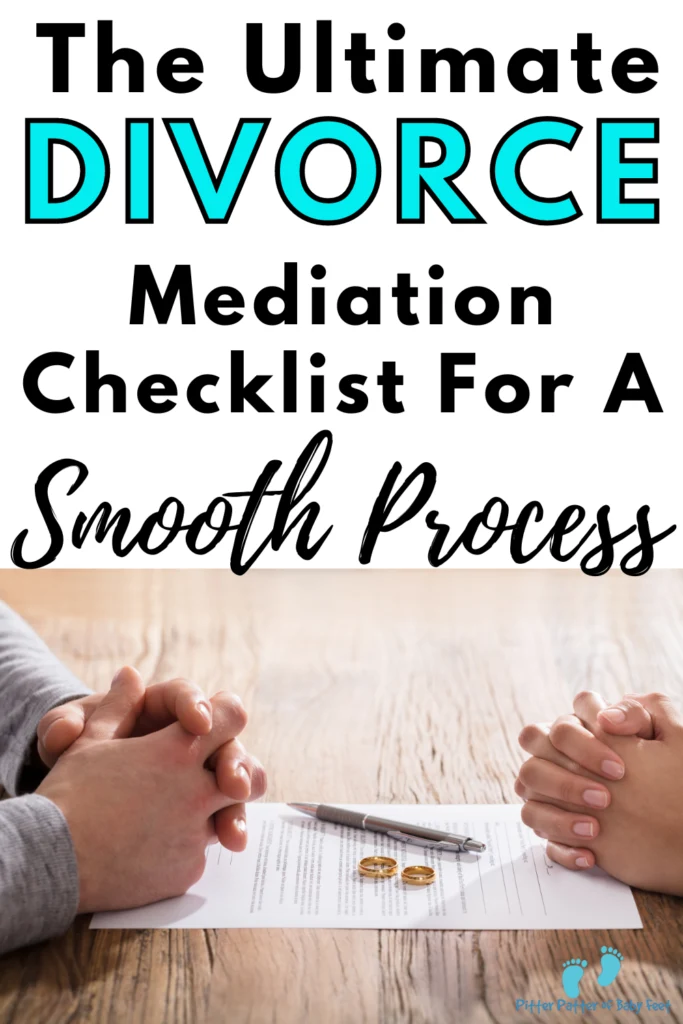The process of dealing with one’s divorce through mediation has evolved to become one that is less financially taxing and more ‘harmonious.’
However, it is important to keep in mind that not all divorce cases are suitable for the process of divorce mediation.
In most divorces, mediation is the first avenue for couples to take. But sometimes mediations are not always simple and successful.
Divorces can be brutal especially when one partner does not want to compromise!
Disclosure: Bear in mind that some of the links in this post are affiliate links and if you click on them to make a purchase I will earn a commission. Keep in mind that I link these companies and their products because of their quality and not because of the commission I receive from your purchases. The decision is yours, and whether or not you decide to buy something is completely up to you.
Common Questions About Mediation
When Mediation Is Likely To Fail
Let’s start with the elephant in the room… An uncooperative partner!
In situations in which you are being abused by your partner, seeking the protection that the court can give you is strongly advised.
Abuse can take many forms including mental, sexual and physical.
When those elements are present in a marriage and separation, financial abuse is also highly probable!
It is extremely unlikely that you will be able to agree with your spouse about issues related to the divorce through the use of mediation when you are dealing with a partner who is constantly arguing with every word that passes between the two of you.
Mediation is not going to be enough to solve the problem as long as there are issues that need to be addressed due to a lack of cooperation on either side.
If you and your partner are having trouble reaching an agreement on how to proceed with the divorce, it may be in your best interest to seek the advice and representation of an attorney who specializes in family law.
Your lawyer is your best line of defense when faced with abuse of any kind from your spouse.
First, Remember Divorce Mediation Requires Compromise
If both parties are willing to compromise and agree to confer with one mediator rather than seek the legal advice of separate attorneys during the divorce process, then mediation can be successful and beneficial.
In this way, the costs of going to court can be reduced for both parties.
The total cost of the divorce process can often be greatly reduced through the use of mediation, and both you and your spouse will typically have more control over the terms of the agreement.
The advantages of mediation typically speed up the process of reaching an agreement, which ultimately results in a productive and long-lasting settlement.
It has also been observed that children experience less stress during the mediation process compared to when there is a full-blown court case with lawyers and everything involved.
Simply bringing up this point may be enough to get a contentious couple interested in mediation right away.
What Does It Mean To Mediate?
A neutral third party, known as a mediator, works with a couple to help them reach an agreement regarding their divorce.
A mediator is not there to make decisions for you, despite the widespread misconception to the contrary.
Nor will he or she attempt to instruct you and your partner on how things should be conducted.
In the process of assisting you in making your own decisions regarding the divorce, a divorce mediator will merely outline the issues at hand for both you and your spouse.
This procedure is typically completed by asking a series of questions and focusing on the outcomes rather than dwelling on any disagreements that may have arisen during the process.
Even though some disagreements might arise, one shouldn’t give up so easily on the conversation.
The simple fact that both parties agreed to participate in mediation indicates that they are capable of working together.
In most cases, the thought that a couple’s children will be spared further anguish by participating in mediation can serve as an incentive for the parties to reach a mutually agreeable resolution.
How Long Is Mediation Going To Take?
The duration of the mediation process could range anywhere from a few weeks to an entire year.
It depends largely on you and your spouse, as well as the degree of difficulty involved in the issues at hand.
The duration of the mediation process can be shortened with relative ease if you and the other party are able to resolve your differences quickly and amicably.
Both parties need to have a comprehensive understanding of the rights that are available to them as well as the various options that are at their disposal in order to move this process forward.
The mediator will provide the parties with a Memorandum of Agreement to record the terms of the agreement.
The terms of a Separation Agreement could then be drafted using this earlier agreement as a foundation.
It is possible that the translation of the agreements will require the assistance of an attorney.
Related Articles: Signs Of Financial Abuse During Divorce
12 Signs Of Manipulation Abuse
Emotional Abuse Is Abuse
Divorce Mediation Checklist
Now that we covered what mediation is and common questions about it, it’s time we cover the divorce mediation checklist to get you prepared with your best foot forward.
1. Bring A Lawyer
Yes, there is a possibility of doing mediation without a lawyer. However, not many people would advise you of this. Especially if you and your ex spouse do not see eye-to-eye and the tension is too high.
A lawyer can be without you through the mediation process to help you advocate for your rights during divorce and help give you a voice when your ex spouse is trying to tear you down.
At the very least, a lawyer can be there through your divorce proceedings to do the paperwork. There is a lot of paperwork to complete to get a divorce and it’s worth it to pay a lawyer to help you navigate this difficult process and even possibly end things sooner!
2. Devise A List Of Assets
A list of assets is everything you and your spouse own. To start this list, always list the bigger assets first! Properties, houses, vehicles, water crafts, stocks, 401k’s and more should all be at the top of your assets list.
It doesn’t matter who has what. List your spouses stocks and 401k because they are important elements in a divorce proceeding especially if you live in a “community property state” where all assets are divided between each other 50/50.
3. List The Extra’s
Extra’s all are the little assets that compromise your household things.
Such things as:
- Gym equipment
- Pans
- Dishes
- Silver
- Jewelry
- Safes
- Furniture
and much more are all the small things you can add to the list of wants for yourself. Some of these items may even be priceless to you or not replaceable.
Always remember though that mediation is about compromise. If your spouse wants to argue over a certain item and the item is replaceable for you, let it go and rebuy the item at a later time.
However, if you have sentimental items like your grandmother’s China set, then you need not compromise!
It is an important possession given to you by a blood relative that can be replaced and you should fight for items like this during mediation.
4. Be Willing To Let Go
If divorce teaches you one thing it’s this: Your life is changing for better or worse. There’s no way around it. You’re building a new life without the help of your partner.
At the end of mediation what’s most important is to try and keep things civil between yourself and your ex spouse.
To do that, you may need to let things go and compromise for the sake of the divorce.
5. Come With Financial Records
Financial records consist of all debts occurred during the marriage. This can be hospital bills, credit card statements, bank accounts, stock financial paperwork and more.
This is beneficial to have on hand at mediation because debt made during marriage and debt made during separation from another spouse has to be calculated to determine who is responsible for what debt.
6. Child And Spousal Support
If you have children together, divorce becomes a lot more complicated. While some spouse are extremely civil and can function without a parenting plan, this isn’t suggested by most!
A parenting plan helps eliminate an potential fighting there may be over who gets the children and when.
With a parenting plan also comes child support. While child support is typically taken from the spouse who earns the most and who has the children the most.
If a full-time mother raises the children at home and the father works, then the child and spousal support is paid by the father.
Spousal support or alimony is a sensitive subject in divorce. Whoever pays spousal support is typically not happy about it and it can cause more friction within a divorce.
However, certain circumstances are deemed by the court as spousal support being needed. If you are the spouse in needed of spousal support, there needs to be a plan of action as to how much and how long you may need spousal support.
Again, divorce and mediation is about coming to terms with one another. Spousal support is always something that is argued between spouses and their lawyers.
While you might not get the amount you are asking for, you may have to compromise with a lesser amount than expected or nothing at all in exchange for something more important to you.
Related Articles: The Best Self-Help Books For Emotional Abuse Recovery
6 Steps For Emotional Abuse Healing
11 Lesser-Known Signs Of Emotional Abuse
Final Thoughts
Divorce is like war. There’s many heated exchanges and there is always bloodshed in the form of insults and financial distribution.
Hopefully, with this divorce mediation checklist you can walk into mediation prepared to fight your best fight for your rights and the rights of your children (if you have any) and quicker resolution to the complicated divorce process!

Works Cited
Separation/Divorce Checklist (mediationcville.org)

